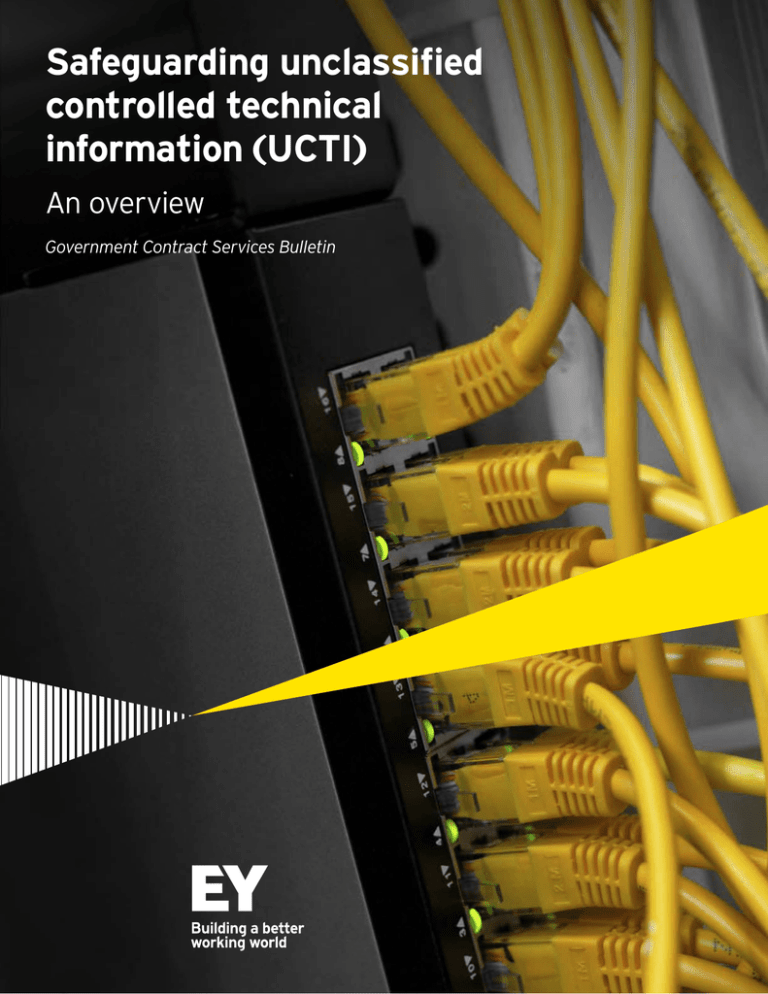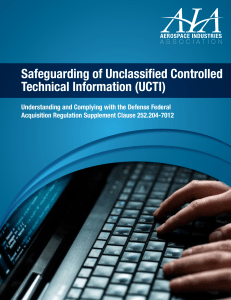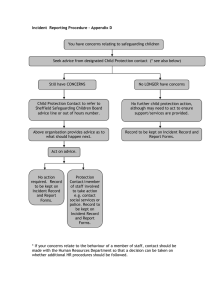
Safeguarding unclassified
controlled technical
information (UCTI)
An overview
Government Contract Services Bulletin
Safeguarding UCTI
An overview
On November 18, 2013, the Department
of Defense (DoD) issued a final rule
mandating the protection requirements
around unclassified controlled technical
information (UCTI) for all DoD contractors
and subcontractors.
In June 2011, the DoD proposed
to amend the Defense Federal
Acquisition Regulation Supplement
(DFARS) to add a new subpart
and associated contract clauses
addressing requirements for
safeguarding unclassified DoD
information. In November 2013,
the rule was finalized and, effective
immediately, clause 252.204–7012,
Safeguarding of UCTI, was mandated
to be included in all new solicitations
and contracts, including those for
commercial items.
2
| Safeguarding UCTI An overview
Primary requirements of
DFARS 252.204–7012:
• DoD and its contractors and subcontractors
must provide adequate security to
safeguard DoD unclassified controlled
technical information resident on or
transiting through their unclassified
information systems from unauthorized
access and disclosure.
• Contractors must report to DoD certain
cyber incidents that affect the protected
information.
What is UCTI?
Controlled technical information has a
military or space application or falls under
the definition of research and engineering
data or engineering drawings, including
associated lists, specifications, standards,
process sheets, manuals, technical
reports, technical orders, catalog items,
identifications, data sets, studies/analyses
and related information, and computer
software executable code and source code.
The DoD is expected to mark UCTI items
requiring protection; however, it is unclear at
this time how the requirements for marked
data will be defined and applied.
Security and safeguarding
To be compliant with DFARS 252.204–7012, contractors must establish reporting and accountability requirements
and flow UCTI requirements to subcontractors. Contractors must also maintain knowledge of the company’s and
subcontractors’ current state of compliance, including gaps to the required controls and documented mitigating
controls. Finally, contractors must actively monitor all systems that store, manipulate or transmit UCTI for cyber events.
The 51 minimum required security controls for UCTI requiring safeguard are specified in the National Institute of
Standards and Technology (NIST) Special Publication (SP) 800-53.
Cyber incident reporting
In addition to security controls and safeguard requirements, contractors are required to report all cyber
“incidents.” DFARS 252.204–7012 defines the information required to be reported and requires that contractors
maintain incident evidence for at least 90 days from the date of the cyber incident to support the DoD in the
event it conducts a damage assessment.
When is cyber incident
reporting required?
Incident reporting is required within 72 hours of discovery of a cyber
incident that affects DoD UCTI.
•
It includes exfiltration, manipulation, or other loss or compromise
of UCTI resident on or transiting through a contractor’s, or its
subcontractors’, unclassified information systems.
Any other activities that allow unauthorized access to the contractor’s
unclassified information system on which UCTI is resident on or
transiting also apply.
What is a reportable
cyber incident?
•
What is the risk
of noncompliance?
•
•
Contractors found to be noncompliant with DFARS 252.204–7012 may
be removed from information technology procurements supporting
national security systems and in some cases may be unable to protest
their removal.
Compliance challenges
With the expansion of cybersecurity regulations for contractors comes new and compounded compliance
challenges, including:
• Interpreting the definition of UCTI and marked data
• Identifying systems considered to be in-scope
• Overseeing and monitoring of subcontractor compliance
• Meeting incident reporting deadlines
Safeguarding UCTI An overview |
3
UCTI compliance framework considerations
A framework is imperative to help establish and maintain compliance with the DFARS UCTI requirements. The steps
below should be considered when developing your framework.
•
Identify confidential information assets and key systems where UCTI resides
Evaluate security control effectiveness over systems that store, process and transmit UCTI
Identify regulatory and disclosure requirements
Identify threat groups, vulnerabilities and evidence to be analyzed
Evaluate subcontractor risk and required processes
•
•
•
•
Identify
•
Design and implement compliant security controls
Review cyber-monitoring processes for adequacy
Review logs to detect access to sensitive information and filter suspicious events
Remediate third-party contracting processes
Document and communicate the rationale for excluding any required NIST controls
•
•
•
•
Protect
•
Develop a communications plan for reporting incidents to a contracting officer
Examine and preserve key log data for hostile activity
Identify suspicious events and incidents that may have occurred and that may be required to be
reported within a 72-hour period
Evaluate the current data preservation plan for compliance with evidence maintenance criteria
•
•
•
Detect
•
Forensically preserve and maintain incident evidence for the required 90 days
Respond to Defense Contract Audit Agency (DCAA) and contracting officer inquiries and
audit results
•
Respond
•
Restore any capabilities or services that were impaired due to a cybersecurity event
Identify control improvements and develop remediation plans
Update Government contracting processes to address compliance with key regulations
Flow provisions to subcontracts and monitor subcontractor compliance and reporting
•
•
•
Recover
•
•
Monitor
4
| Safeguarding UCTI An overview
Establish a plan for ongoing monitoring of DFARS 252.204–7012 UCTI requirements
Periodically assess related controls and complete corrective action plans for identified deficiencies
and control exceptions
About EY’s UCTI response team
The combination of distinct skills and integration across EY allows us to offer a seamless end-to-end approach
to maintain compliance with government contracting challenges including UCTI regulations.
Ernst & Young LLP
Government Contract
Services (GCS)
Ernst & Young LLP
Fraud Investigation and
Dispute Services (FIDS)
Ernst & Young LLP
Information Technology
Risk Assurance (ITRA)
Our team of experienced professionals has
both the depth of knowledge and breadth of
experience in applying the procurement rules
and regulations of Government agencies.
Our FIDS team has the capabilities to
perform incident investigations, collect and
preserve evidence, manage the reporting
of an incident to the DoD, and manage the
continued preservation and maintenance of
evidence for the required 90 days.
Our ITRA team can assist with the
identification of systems where UCTI
is stored, assessments against the 51
required controls, documentation of
compliance with required controls,
identification of gaps and mitigating
controls, development of ongoing compliance
processes, control remediation, reviews of
cyber-monitoring processes for adequacy,
post-incident lessons learned, and the design
of necessary control improvements.
Contacts:
Robert Malyska
Partner
Government Contract Services Leader
+1 214 969 8628
robert.malyska@ey.com
Todd LaMastres
Partner
+1 214 969 8484
todd.lamastres@ey.com
Deborah Nixon
Partner
+1 703 747 1478
deborah.nixon@ey.com
Darl Rhoades
Executive Director
+1 720 931 4022
darl.rhoades@ey.com
Frank Summers, Jr.
Executive Director
+1 617 375 1285
frank.summersjr@ey.com
Contacts:
David Remnitz
Partner
Global & Americas Forensic Technology &
Discovery Services Leader
+1 212 773 1311
david.remnitz@ey.com
Kenneth Feinstein
Senior Manager
+1 203 674 3177
kenneth.feinstein@ey.com
Ken Zatyko
Senior Manager
+1 202 327 7185
ken.zatyko@ey.com
Contacts:
Mark Johnson
Principal
+1 703 517 3442
mark.johnson@ey.com
Michael Baker
Senior Manager
+1 703 747 0710
michael.baker@ey.com
Kelly Volz
Senior Manager
+1 202 327-5684
kelly.volz@ey.com
Steven Tremblay
Executive Director
+1 617 375 2420
steven.tremblay@ey.com
Safeguarding UCTI An overview |
5
EY | Assurance | Tax | Transactions | Advisory
About EY
EY is a global leader in assurance, tax, transaction and advisory services. The
insights and quality services we deliver help build trust and confidence in the
capital markets and in economies the world over. We develop outstanding
leaders who team to deliver on our promises to all of our stakeholders. In so
doing, we play a critical role in building a better working world for our people,
for our clients and for our communities.
EY refers to the global organization, and may refer to one or more, of the
member firms of Ernst & Young Global Limited, each of which is a separate
legal entity. Ernst & Young Global Limited, a UK company limited by guarantee,
does not provide services to clients. For more information about our
organization, please visit ey.com.
Ernst & Young LLP is a client-serving member firm of Ernst & Young Global
Limited operating in the US.
© 2014 Ernst & Young LLP.
All Rights Reserved.
SCORE No. WW0339
CSG No. 1402-1206209
ED None
This material has been prepared for general informational purposes only and is not intended to be relied
upon as accounting, tax, or other professional advice. Please refer to your advisors for specific advice.
ey.com



